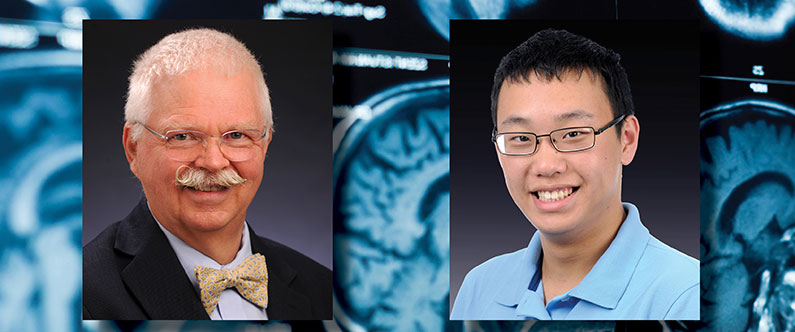WCM-Q student enjoys research success
 Dr. Dietrich Büsselberg and Kevin Zhai.
Dr. Dietrich Büsselberg and Kevin Zhai.
A student at Weill Cornell Medicine – Qatar (WCM-Q) has had three research papers published during just two years in the pre-medical curriculum.
Kevin Zhai, who has only recently completed the second year of the pre-medical curriculum, joined WCM-Q in September of 2019 and within just a few months had approached Dr. Dietrich Büsselberg, acting associate dean for admissions and professor of physiology and biophysics, to ask if there were any studies with which he could become involved.
Dr. Büsselberg said: “I am always open to students undertaking research, but it is rare that a student already approaches me within the very beginning of the first pre-medical year. At such an early stage in their medical education, it is a major challenge to make it a success.”
However, Kevin has proved the exception to the rule, never missing meetings and always being prepared. Such was his dedication, he carried out more and more research studies.
Dr. Büsselberg said: “The work we are doing are literature reviews which collate other studies and distill their findings, so creating a more complete picture within one research paper.
For students, participating in these studies is very useful as there is such a large amount of reading to do; they learn about science in general, which is a considerable challenge. For many young students it can be too complicated and too demanding, but Kevin has risen to the challenge, and he now has first authorship on three papers that have been published by medical journals and he is not yet even in the medical curriculum.”
The research has examined how natural substances can influence brain cancers, with the work leading to three papers: ‘Natural Compounds in Glioblastoma Therapy: Preclinical Insights, Mechanistic Pathways, and Outlook’, published in the journal Cancers; ‘Curcumin’s Beneficial Effects on Neuroblastoma: Mechanisms, Challenges, and Potential Solutions’, published in Biomolecules; and ‘Calcium Entry through TRPV1: A Potential Target for the Regulation of Proliferation and Apoptosis in Cancerous and Healthy Cells’, which has appeared in in the International Journal of Molecular Sciences.
Kevin said: “I am particularly interested in the mechanistic and cellular processes that underly brain cancers, and how these processes can be leveraged in anticancer treatment. I am grateful that I could explore this topic in three published studies, which focused on glioblastoma, neuroblastoma, and the TRPV1 channel, which is involved in both pain- and cancer-related signaling. I see neuro-oncology - as a sub-field within neurosurgery or neurology - as a future specialty.”
The research involved Kevin critically evaluating the published literature on the topic, extracting and synthesizing data, and constructing mechanistic pathways. Dr. Büsselberg provided mentorship through regular meetings where the findings were discussed and guidance given on the direction of the study. Kevin also provided an outline and draft of each manuscript to be sent for publication.
Reflecting on his experience, Kevin said: “I felt elated when my first article was accepted for publication and I see this as a major milestone in my academic career. It was also very rewarding to have the article accepted after nearly a year spent conceptualizing and performing the study, writing the manuscript, and revising the work through several rounds of peer review. Looking back, I am very thankful to have had the opportunity to be so involved in research during my premedical years, and I am grateful to Dr. Büsselberg for his ongoing mentorship that made this experience possible.”